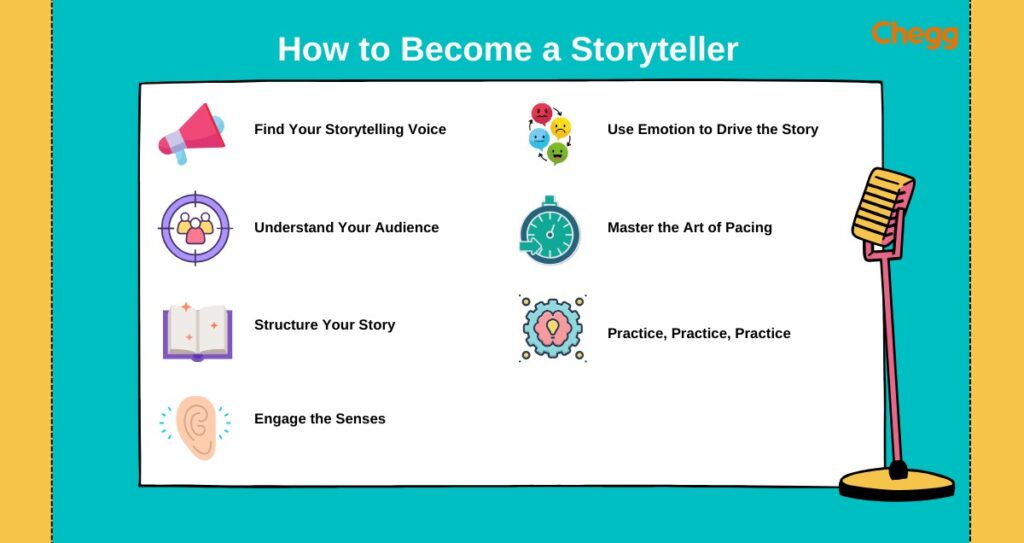How to Become a Good Storyteller and Captivate Your Audience
Think about your school days! Before social media or personal phones, being a storyteller was our way to connect with friends, sharing stories during classes or lunch breaks—it was the highlight of the day, whether it was a wild adventure from summer vacation, a sweet moment with your crush, a funny encounter, or something entirely […] The post How to Become a Good Storyteller and Captivate Your Audience appeared first on Chegg India.

Think about your school days! Before social media or personal phones, being a storyteller was our way to connect with friends, sharing stories during classes or lunch breaks—it was the highlight of the day, whether it was a wild adventure from summer vacation, a sweet moment with your crush, a funny encounter, or something entirely cooked up on the spot! Storytelling has always been a way to connect, entertain, and draw people in. It is said that anything through stories are remembered 22 times more than only facts.
So, how do you evolve from casual tales shared among friends to becoming a storyteller to connect with your audiences? And what exactly sets a great storyteller apart from the rest? It is the voice of the storyteller that can connect with us on so many levels- emotionally, physically, and mentally. Whether you want to write, speak, or just share better stories with those around you, storytelling is an art anyone can master. In this blog, we will explore the essential techniques and mindset you need to become a storyteller who leaves a lasting impact.

Understanding the Power of a Storytelling
Before getting into how to become a storyteller, let us discuss why storytelling matters. Storytelling is a great way to connect with humans because we are naturally wired to respond to stories. Our brains don’t just process stories logically but emotionally. A good story activates multiple parts of the brain, making the experience immersive. A good storyteller can be an excellent teacher who can use storytelling methods to engage and inspire students to study with more enthusiasm.
Storytelling has the power to make inspirational change. Take The Alchemist by Paulo Coelho —this novel has motivated countless readers to follow their hearts and pursue their dreams. Through its powerful narrative and relatable themes, the story encourages readers to follow their dreams and take action in their own lives. This is the true power of storytelling: it doesn’t just entertain—it influences, inspires, and drives personal growth. This emotional engagement is what makes storytellers stand out. A great storyteller has the power to influence, entertain, educate, and inspire action.
How to Become a Storyteller

Here are the steps to become to enhance your narrative skills:
Find Your Storytelling Voice
The first step is finding your unique voice. This isn’t just about how you speak or write but how you express emotions and ideas. Think about how you naturally tell stories to friends or family. Are you funny, reflective, or dramatic? The more you understand your style, the more authentic your storytelling will become. Authenticity is what will make you stand out and connect with their audience.
Understand Your Audience
Knowing your audience is key to becoming a successful storyteller. Every audience is different, with unique emotions and expectations. By catering your story to their needs, you can create a deeper connection. Ask yourself, “Who is listening to my story?” and “What do I want them to take away?” A good storyteller always keeps their audience in mind to make their narrative more relatable and impactful.
Structure Your Story
Your story should have a introduction, middle part, and ending. Iintroduce the characters first while also setting up a problem or conflict giving the theme of the story. The middle is where the tension builds, and in the end, everything gets resolved. Using this structure will help you to engage better with your audience. An experienced storyteller might play with timelines or perspectives to make their story even more engaging.
Engage the Senses
To make your audience feel like they are part of the story, engage their senses. Use descriptive language that allows them to visualize and feel what’s happening.A good storyteller uses sensory details to immerse the audience in the experience. For instance, instead of saying, “It was cold,” say, “The icy wind bit at my skin.”
Use Emotion to Drive the Story
The most memorable stories are the ones that evoke strong emotions. Whether it’s happiness, sadness,excitement, love or anger emotion is the key to connecting with your audience. A great storyteller knows how to show emotions through characters’ actions, dialogue, and expressions. Remember, people may not recall every detail of your story, but they will remember how it made them feel.
Master the Art of Pacing
Pacing is crucial in storytelling. Move too fast, and your audience might miss important details. Move too slow, and they could lose interest. A skilled storyteller knows when to slow down and savor emotional moments, and when to speed up for action-packed or exciting scenes. Finding the right balance will keep your audience engaged.
Practice, Practice, Practice
Becoming a good storyteller takes practice. The more stories you tell, the more you’ll learn about pacing, delivery, and connecting with your audience. Practice by sharing stories with friends, recording yourself, or studying other storytellers. Remember, every story you tell helps you
Wrapping Up
Becoming a storyteller is about finding your voice, engaging your audience, and connecting with them on an emotional level. By practicing the art of storytelling, you can inspire, entertain, and create lasting memories in the minds of those who hear your tales. Whether you’re telling stories to inform, entertain, or persuade, the journey to becoming a storyteller is both personal and powerful.
So, pick up your pen or step up to the mic—there’s a storyteller in you waiting to emerge.
Also Read:
7 Books for Kids that will Turn Them into Passionate Readers!
Haruki Murakami Books: Read What Millions are Reading
The post How to Become a Good Storyteller and Captivate Your Audience appeared first on Chegg India.


















/cdn.vox-cdn.com/uploads/chorus_asset/file/25115065/DCD_Avishai_Abrahami.jpg)







